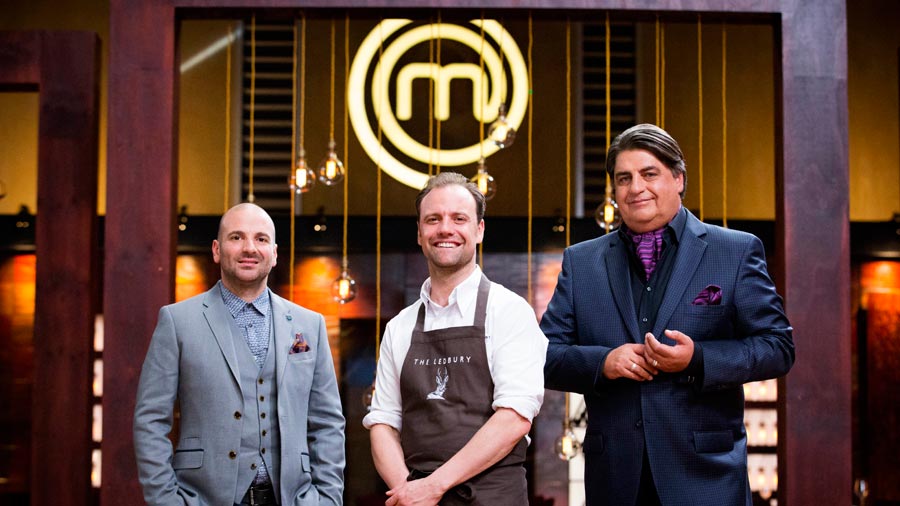Your cooking career began at age 15 in a “simple fish restaurant” in Newcastle – what were your goals at that time?
At a young age I was so amazed by how a restaurant ran, I couldn’t fathom how hard people were working, and people cooking with so many different ingredients. At that stage I didn’t really know how to cook even simple things and I’d never been in a professional environment. I hadn’t had much exposure to food either. All I really wanted to do was become a chef; that was my goal.
Do you think that experience is going to help you relate to the MasterChef contestants?
Yeah I think so. When I first started cooking I was so green, my knowledge was very limited. I didn’t come from a ‘foodie’ background; in the late eighties to the early nineties food wasn’t top of the agenda for most families, compared to today. I didn’t have that background of knowledge like some people from other backgrounds or other places had, so it was a very steep learning curve for me.
The Ledbury, your restaurant in Notting Hill, opened in 2005 - what were the biggest challenges you have overcome before and since the opening?
Again, I was so young when I opened the Ledbury: I was 23 years old. I had a lot of enthusiasm and a lot of energy about the different things we could try on the menu. Then something dawned on me when we opened, and it was that I had never been a head chef, I’d never written a rota - I had only been a sous chef. So because of my lack of experience it was a real battle, and I really struggled both emotionally and physically trying to co-ordinate everything. It was a real challenge for me. Being 25 years old and receiving your first negative review from the Sunday Times is a tough thing for a young man to swallow, and it did sort of knock me around a bit. Michael Winner (restaurant critic at The Times) wrote something like, “The Ledbury should be knocked down and turned into a car park, because a car park would be useful in this part of London, not this restaurant.”
How did you deal with that feedback?
It’s difficult because you feel like you’re letting down your business partners, you feel like you’re letting down your staff, you feel like you’re letting down your family a little bit and so you feel a level of disappointment. But you have to just get up every day and try to chip away the edges, focus on the next day and try to improve a little bit every day, and that’s what we did.
The MasterChef contestants do at times face very honest feedback throughout the show themselves…
Yes, I think it’s difficult for any young person and you can definitely see the pressure these guys are under. They’re not only under pressure to try and cook and learn new skills; sometimes we forget these guys are not professional cooks. But if someone had told me the current contestants are young professional cooks I would believe them. You can see how much they’ve evolved from the beginning of the competition.
You said it was a "huge surprise” when The Ledbury was named tenth best restaurant in the world in 2014 – why was that?
I think food is a bit like fashion, it’s unlike a tennis match or a golf tournament where there’s a number one in the world for a reason and that is because they beat everyone else. Cooking and restaurants however are subjective. What is in your top ten might not be in my top ten and so opinions will always vary. We never set ourselves a goal to arrive in that list, that’s a huge achievement that I am very proud of but it is a list like any other and I don’t think you can get too hung up on that being the only guide to how good a restaurant is. There are lots of guides around the world and I think you need to try and aim to perform well in all of them across the board, which means that you are looking after your customers well.
How have your achievements changed, or not changed, your approach to cooking and food?
I think what really drives me is talking to customers. We’re really focused on what customers want, what customers need. Sometimes we are even trying to figure out what to take away from a customer’s experience to make it better. We are constantly having conversations about ways to approach customers and tables and how we should treat everybody as an individual. For instance one of the things that we have been talking about recently is how do we approach a table of elderly customers differently to a table of young people. I think gone are the days of restaurants being too formal. People come to restaurants much more frequently than they used to and I think we need to adjust to that and I think it draws parallels to the food as well. So that’s how we are changing all the time, trying to gauge what are customers want, and that’s what guides us.
Do you find that customers want more than a culinary experience, but also an emotional experience?
I think what is really important is hospitality. It sounds crazy, but I think lots of restaurants get that bit wrong. We are open because we want to serve customers and we enjoy serving them. I don’t want my guests to feel like they are lucky to be there, I want my guests to feel like we are happy to have them there.
Is that a piece of advice that you might pass on to the contestants?Yes, it’s something that I tell my young chefs all the time. You can be the best chef in the world but if you don’t care about your customers you will have an empty restaurant. That’s the one thing I try to get across to my guys, that by the time they leave me they go away saying, “The Ledbury changed the way I think about restaurants,” not just, “It’s the best food I’ve ever cooked.”
Why is sourcing top quality ingredients from small-scale suppliers so important to you?
I’ve changed the way I think about a lot of this stuff. At The Ledbury we don’t use any grain fed beef. We only use native breeds that eat grass, the way it’s meant to be. Although there are probably a lot of producers in Australia that are good at doing grain fed beef and combining that with grass. I think that I enjoy the flavour of grass fed beef and lamb. And I love that ‘free range’ approach to meat. That’s one consideration for me.
You were tutored by top chefs in Sydney and the UK – what knowledge do you hope to share with the MasterChef contestants?
One of the really important things I want to impress on them is to taste their food as they’re cooking. It is amazing how many young people don’t taste what they cook. You have to taste every single thing you do. It helps train your palette and helps fine tune the amounts of seasoning you put into your dish. Another thing I try to teach them is to really think about how they are cooking. Sometimes you see guys cooking and they are a bit messy, they’re not quite perfectly organised but they produce the most beautiful and delicious food. That’s the most important thing. I can forgive someone who is a little less organised then someone else if the food they are producing tastes great.
What one piece of advice would you give to this years’ contestants?
If you want to be a great cook and you are in this competition, use it as an experience for you to try and take your career forward. Don’t go too quick. Take your time, maybe do an apprenticeship, start at the very bottom. Take your time and learn from the best.
When you were a child, what was your favourite thing to eat?
It’s quite a weird thing, I think it’s more of a food memory, but it would have to be a smoked oyster on a Jatz cracker. I remember my dad giving me one and I was absolutely amazed at how it tasted.
Describe what you would eat if you could choose your last supper:
It would be three teal, which is a type of wild duck, cooked in brown butter and served with a napkin.
If you could only own one cookbook, which one would it be?
The Great Chefs of France by Quentin Crewe. Published in 1978.
What three things do you always have in your pantry?
Goats milk butter, leftover sourdough from the restaurant and good quality sherry vinegar.
Your friends are coming over in 30 minutes, what do you cook for them?
I would cook them a warm salad of new potatoes, with smoked mackerel watercress and horseradish.
What foods can’t you live without?
Wild mushrooms and venison.
Can you describe your most memorable meal?
I had my 30th birthday with my dad at Noma [in Copenhagen], which was amazing. René Redzepi [the head chef] is so well known around the world and he is a fabulous chef who knows a lot about food at a different level to most other cooks.
What’s your favourite comfort food?
Once or twice a year I’ll eat a frozen fish finger sandwich on soft white bread with cold tomato sauce and iceberg lettuce. Or a Cornish pastie.





























